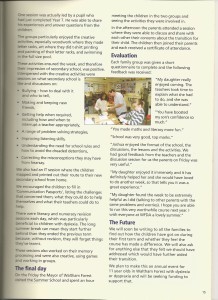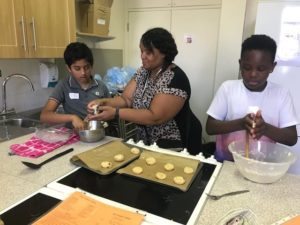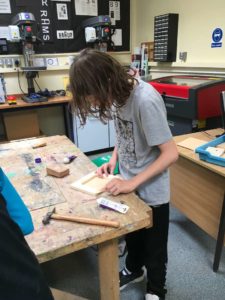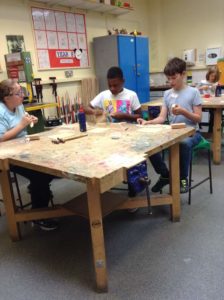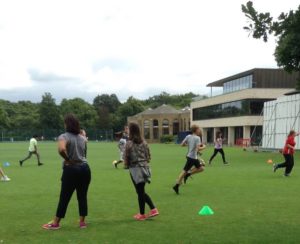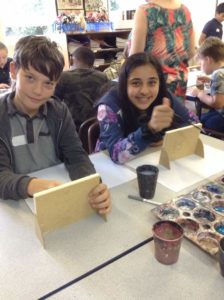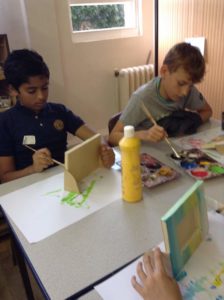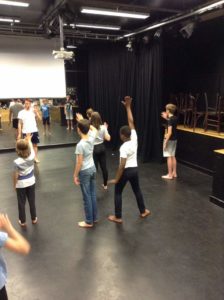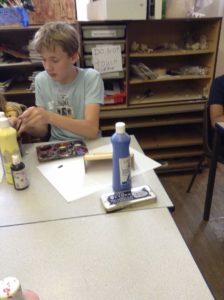Click the links below for:
Summer Transition club pictures
Press release from BDA Dyslexia Contact Newsletter 2009
Testimonials – Transition Summer Club
Transition Summer Club.
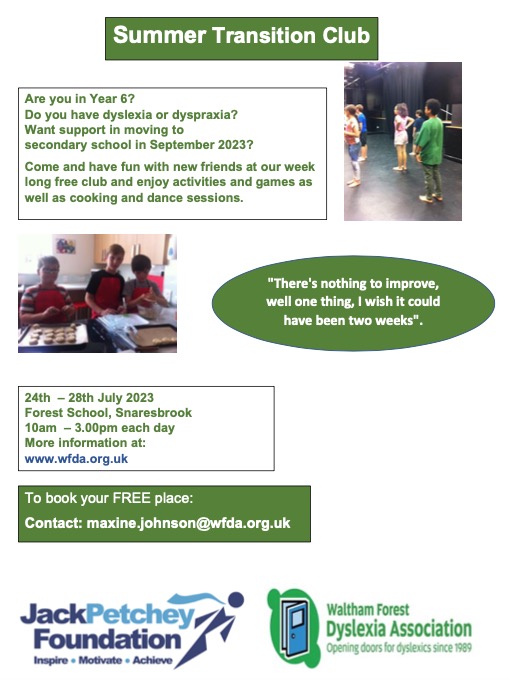
Summer Transition Club 26 – 28 July register now – WFDA will be running a /free club for Year 6 pupils with dyslexia/dyspraxia moving on up to Year 7. The club will be run online this year but will include cooker and dance.
If you would like to register your child for a free place please send an email to:
info@maxinejohnsondyslexiaservices.co.uk
Click on the flyer image for more information. Please print and pass on to your school.
Help Sheets
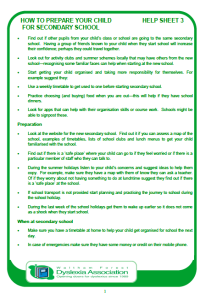
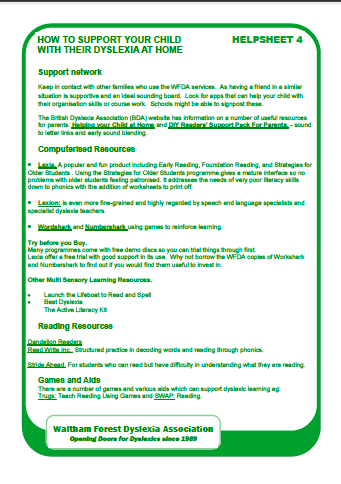
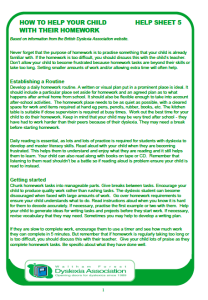
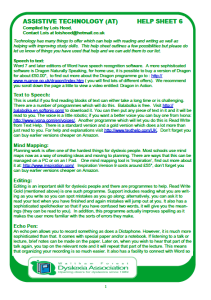
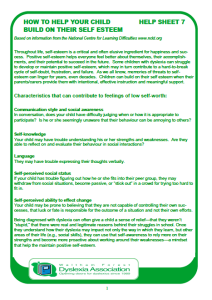
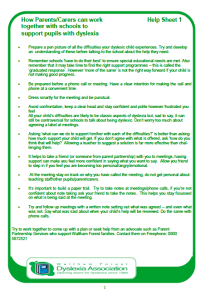
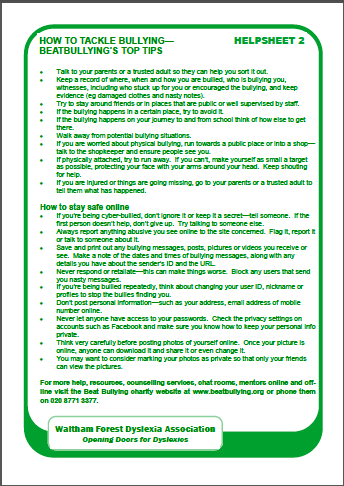
Our aims for the club:
1 To support the students in making the transition to secondary school.
 Varied timetable of activities to give students a ‘taste’ of starting secondary school including dance, woodwork, art, sports, swimming and ‘cyber safety’ to address bullying on the internet. The remaining sessions focused on preparation for secondary school as well as a story and drama programme, used successfully the previous year. Students make a magazine to keep of the week.
Varied timetable of activities to give students a ‘taste’ of starting secondary school including dance, woodwork, art, sports, swimming and ‘cyber safety’ to address bullying on the internet. The remaining sessions focused on preparation for secondary school as well as a story and drama programme, used successfully the previous year. Students make a magazine to keep of the week.
Parent: ‘I think that the club gave a good overall impression that high school was going to be manageable and really reassured her that all the students were all worried and she was kind of nervous, but the club helped her prepare emotionally more than academically’.
2 To try and resolve any issues the students have and reassure them.
 Students were split into two smaller groups for certain activities and this created a more intimate and supportive atmosphere. In their groups the children demonstrated that they were keen to explore the problems they may experience when transferring to secondary school and there was plenty of time to discuss various issues and possible solutions. All the children benefited from the interaction with both adults and peers.
Students were split into two smaller groups for certain activities and this created a more intimate and supportive atmosphere. In their groups the children demonstrated that they were keen to explore the problems they may experience when transferring to secondary school and there was plenty of time to discuss various issues and possible solutions. All the children benefited from the interaction with both adults and peers.
To achieve this aim, the staff were carefully selected, vetted and supported. A student who attended the club the year before came back as a peer mentor throughout the week. Without prompting two of the students attending this year have offered to take up this role for next year’s intake.
One parent stated
‘Socialised with the other kids, helped him understand he wasn’t the only one, everyone in the same boat, the kids could talk to each other and adults on how to deal with things. Boys, you worry about them going to a different school and he was able to share his worries at peer level. Jan (lead teacher) was really good about dealing with how they felt and they got a chance to speak in classes as the classes weren’t that big they all got a chance to speak, to get their worries across, often the same worries. Sharing the experience with each other’.
3 Activities for the students to experience what secondary school will be like.
 The free accommodation provided by Forest School was ideal as WFDA was able to use the Sixth Form building as a base, which had comfortable area to eat lunch as well as relax. The fact that the students had to move to many different areas for group sessions and other lessons replicated the situation at most secondary schools.
The free accommodation provided by Forest School was ideal as WFDA was able to use the Sixth Form building as a base, which had comfortable area to eat lunch as well as relax. The fact that the students had to move to many different areas for group sessions and other lessons replicated the situation at most secondary schools.
One parent stated that ‘The club itself is such a lovely idea to help those who struggle, and the way it is so positive and fun-filled I imagine contributes to it’s overall success’.
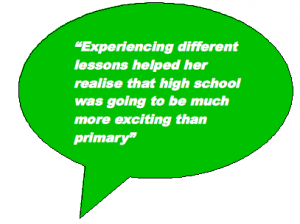 ‘I think woodwork and art, physical stuff, swimming, making things, he likes to learn that way, grasped in his hands; he looks forward to using material. He started to look forward to it more; not as bad as it seemed, he wasn’t thinking like this before he went to the club afterwards he was more optimistic about starting secondary. Brilliant opportunity’.
‘I think woodwork and art, physical stuff, swimming, making things, he likes to learn that way, grasped in his hands; he looks forward to using material. He started to look forward to it more; not as bad as it seemed, he wasn’t thinking like this before he went to the club afterwards he was more optimistic about starting secondary. Brilliant opportunity’.
‘Experiencing different lessons helped her realise that high school was going to be much more exciting than primary’.
4 Build a support network for the students once the club has ended.
 In the two groups of students although many children were going to different secondary schools there were 7 who were transferring to one local secondary school and 5 to another. The students that were going to the same school were grouped together which immediately established a close bond between the students.
In the two groups of students although many children were going to different secondary schools there were 7 who were transferring to one local secondary school and 5 to another. The students that were going to the same school were grouped together which immediately established a close bond between the students.
Students and parents were encouraged to keep in contact with each other after the week and we are aware of several friendships that are being maintained.
Parent confirmed that their child had kept in contact:
‘Yes all the ones at his high school and the one in his form we caught up with them in the summer. Since summer I have started driving lessons from one of the student’s parents as we are now friends with similar people that are outside of my church, its good to know people with similar issues as it’s a great support network for me’.
Student stated that when she started high school:
‘Having my friends from the club helped me not to be scared’.
5 For the students to develop a sense of self-worth and a positive approach to their move to secondary school.
On the first day all the students were very nervous, several were in tears however very quickly all had made new friends and gained confidence.
One parent stated:
‘My son has anxiety about travelling and being away for long periods of time. He has mild autism and slight OCD. He hasn’t gone on school trips and never been left at a club as he needs me (mother) to be there as he gets overwhelmed. He has had SENCO involvement throughout school life and he has separation anxiety. This is the first time he has been left and he feels comfortable about being here as he doesn’t stand out and feels that he fits in.’
One parent wrote:
‘It was nice for her to meet other children with similar problems, going to the club gave her different experiences outside of primary school, the club gave her more confidence, she started to think ‘I can do it’!
‘I think that it showed that other children have similar difficulties which coming from a small class of 30 she couldn’t appreciate. It also provided techniques which she could use to help her organisational skills’.
More pictures of the Summer Transition club

Press release from BDA Dyslexia Contact Newsletter 2009
